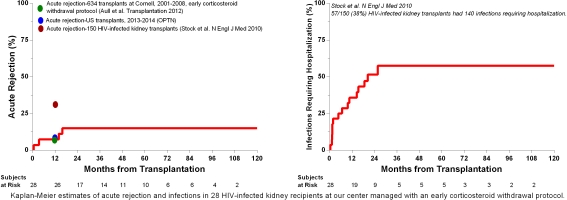Clinical Outcomes of HIV-Infected Kidney Transplant Recipients Managed with an Early Corticosteroid Withdrawal Protocol
Weill Cornell Medicine / New York Presbyterian Hospital, New York.
Meeting: 2018 American Transplant Congress
Abstract number: D154
Keywords: Graft survival, HIV virus, Kidney transplantation
Session Information
Session Name: Poster Session D: Kidney Infectious
Session Type: Poster Session
Date: Tuesday, June 5, 2018
Session Time: 6:00pm-7:00pm
 Presentation Time: 6:00pm-7:00pm
Presentation Time: 6:00pm-7:00pm
Location: Hall 4EF
Aim
Assess the clinical outcomes of HIV-infected kidney transplant recipients managed with an early corticosteroid withdrawal protocol.
Methods
Single center chart review of HIV-infected kidney recipients between 2006 and 2016. Induction immunosuppression included rabbit anti-thymocyte globulin or basiliximab. Intravenous methylprednisolone was given in tapering doses along with the induction agents and were discontinued by day-4 of transplant. Maintenance immunosuppression included tacrolimus and mycophenolate. Infection prophylaxis included co-trimoxazole, valganciclovir and clotrimazole. There were no restrictions on HAART medication usage.
Primary outcome measures were graft and patient survival. All patients were followed in our transplant clinic as per our center's protocol. Graft failure was defined as return to maintenance dialysis. Patients who did not reach their primary outcome were censored at their last follow up.
Results
Twenty eight HIV-infected patients (Female 8 [29%], Black 18 [64%]) underwent deceased (N=22) or living donor (N=6) kidney transplantation. Median (IQR) age was 56 yrs (45-63). CD4+ T-lymphocyte count was 467 (395-518). Five recipients (18%) were co-infected with HCV. Twenty four (89%) received anti-thymocyte globulin induction.
Median follow up was 43 months from transplantation. Five-year Kaplan-Meier survival estimate was 84% (graft survival) and 89% (patient survival).
Two (7%) recipients developed acute rejection within the first year of transplantation. Fifteen (54%) developed infections requiring hospitalization.
Sustained HIV viral suppression was observed in 63% while 28% had one and 9% had two or more viral blips.
Conclusions
An early steroid withdrawal regimen is associated with excellent clinical outcomes in HIV-infected kidney allograft recipients.
CITATION INFORMATION: Al Jurdi A., Liu E., Aull M., Lubetsky M., Serur D., Kapur S., Muthukumar T. Clinical Outcomes of HIV-Infected Kidney Transplant Recipients Managed with an Early Corticosteroid Withdrawal Protocol Am J Transplant. 2017;17 (suppl 3).
To cite this abstract in AMA style:
Jurdi AAl, Liu E, Aull M, Lubetsky M, Serur D, Kapur S, Muthukumar T. Clinical Outcomes of HIV-Infected Kidney Transplant Recipients Managed with an Early Corticosteroid Withdrawal Protocol [abstract]. https://atcmeetingabstracts.com/abstract/clinical-outcomes-of-hiv-infected-kidney-transplant-recipients-managed-with-an-early-corticosteroid-withdrawal-protocol/. Accessed February 19, 2026.« Back to 2018 American Transplant Congress


